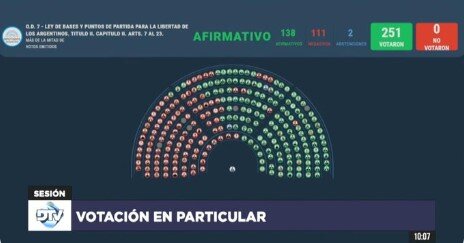
An Embraer 190 jet belonging to Aerolíneas Argentinas. Photo: Carolina Campos.

Orinoco Tribune – News and opinion pieces about Venezuela and beyond
From Venezuela and made by Venezuelan Chavistas

An Embraer 190 jet belonging to Aerolíneas Argentinas. Photo: Carolina Campos.
Chapter Two of the Base Law—also known as the Omnibus Law, as labeled by its proponent President Javier Milei, referring to the privatization of public companies—has been approved in the Argentinian Chamber of Deputies, having obtained the approval of more than 50% of the deputies in the Lower House of the Argentinian Congress, with 138 votes in favor, 111 against, and two abstentions.
The law, passed this Tuesday, April 30, enables the sale and scrapping of state companies. In the original project of the Omnibus Law, Javier Milei’s neoliberal chainsaw intended to fall on 40 state companies and privatize them. Following negotiations with the Republican Proposal party (PRO) and the Radical Civic Union party (UCR), the government agreed to reduce that list to nine public companies, despite these being the most important ones.

Base Law: which companies were included in the privatization chapter?
In Chapter Two of the Base Law, four major public companies were included in the category of “total privatization:”
Argentinian Airlines are currently going through a heavy adjustment plan. Last week, its president, Fabián Lombardo, announced a plan to implement cuts to “reduce the operating deficit by half,” with the closure of cabotage routes in the off-season.
Intercargo is the state company that provides ground services, ramps, and access bridges at airports.
The sale of ENARSA, founded in 2004, means transferring to the private sector the structure of a firm that carries out studies, exploration, and exploitation of hydrocarbon deposits, as well as tasks of transportation, storage, distribution, marketing, and industrialization of that strategic commodity and its derivatives.
Meanwhile, the sale of RTA SE is a new blow to the media map and federal communication, as was the recent closure of the Télam agency. The public radio station network has more than 40 stations throughout the country.
In addition to these four public companies, another five may pass into private hands or be concessioned:
Argentina Makes Formal Application to Become NATO Global Partner
In addition, two other companies may incorporate private capital, although they will keep a majority of state participation:
In these cases, it will be possible “only to organize a joint ownership program and place a class of shares for that purpose; and incorporate the participation of private capital, with the National State having to maintain control or majority participation in the social capital.”
Translation: Orinoco Tribune
OT/JRE/AU
Support Orinoco Tribune team’s unique, amazing, and unmatched work!
5.5 years providing honest and responsible anti-imperialist information about the Global South!
66 months working for you, 18.5K posts published, 60 original pieces in the last 4 months, 21 YouTube interviews over the last 12 months, and much more to come!
Your donations make a big difference!